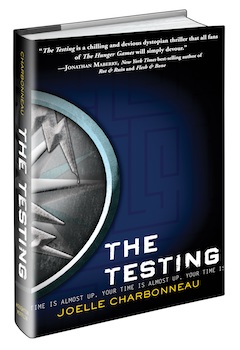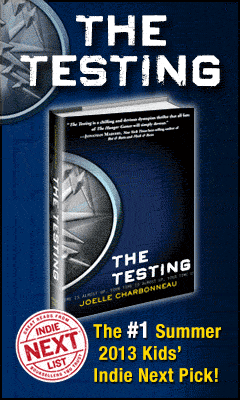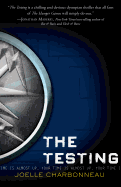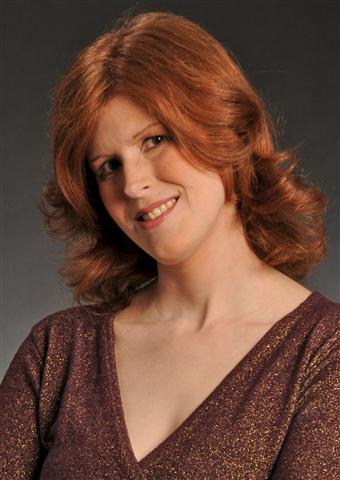The Testing
by Joelle Charbonneau
In Joelle Charbonneau's taut psychological novel, her first for young adults, the Earth has been ravaged by the Seven Stages War, and its inhabitants suffer--economically, ecologically and emotionally. Few people own cars; food, fuel and paper are precious, and water is scarce. But 16-year-old narrator Malencia ("Cia") Vale remains hopeful that if she's selected for the Testing, she'll be able to change things for the better.
It's been 10 years since the last graduate was chosen from Cia's colony, Five Lakes (formerly known as the Great Lakes region), for the Testing--to determine the best candidates for University and to identify possible future leaders of the United Commonwealth. Is that by accident or design? As Ms. Jorghen's assignments got more difficult, Cia wondered if "our old teacher misdirected the Commonwealth into thinking we weren't bright enough to be leaders. And if so, why would she do such a thing? Because she hated to see families separated or because she truly believed something sinister would be lurking for us on the other end of our journey?"
This dystopian novel stands out for its nuanced exploration of the tension that often develops between parents and children on the cusp of adulthood. How much can they continue to protect their children, and when is the right time to arm them with the truth, no matter how painful it is? A rift develops between Cia and her mother, as the teen expresses her hopes for being chosen for the Testing and sent to the Commonwealth's base in Tosu City. Cia also feels some tension with her oldest brother, Zeen, who seems to resent her chance to be chosen.
When Cia is chosen, her father confides to her his recurring nightmares that seem to be connected to his own experience of the Testing. He also explains that her mother's distance stems from the possibility that the Testing could mean the family will never see Cia again. "Go to Tosu City prepared to question everything you see and everyone you meet," her father cautions her. "That might be the difference between success or failure." On the eve of her departure, Cia takes Zeen's Transit Communicator, a device that serves as a compass, a calculator and a communication system. ("I wish Zeen were here to give me permission--to tell me he forgives me for being chosen when he was not.")
Charbonneau creates adult characters as complex as her teens. Michal Gallen, the official who transports Cia and the three other candidates chosen from Five Lakes Colony, seems to show some preference for Cia. He sees her discover a hidden camera and he smiles--in approval? Can she trust Michal? Against her father's warning ("Trust no one"), Cia confides in Tomas--another Five Lakes candidate--about the camera; romantic feelings develop between them.
The author fully exploits the possibilities of standardized testing as a gauge to determine a young person's future in our own society, and asks teens to question whether it's truly a measurement of their self-worth. Everything, it seems, is a test. One candidate commits suicide. Another makes a wrong decision about an inedible plant and winds up dead. In a test to gauge teamwork, one teammate sabotages the rest. In another test, each individual has 10 minutes to choose three items for a journey on the outside. Then the worst happens: Cia begins to doubt Tomas when another candidate tells her, "Watch your back, Cia. Your boyfriend isn't the nice guy he's pretending to be." The seed of doubt had been planted earlier for Cia. Even though the candidates all start out alone, Tomas told Cia to meet up by the fence, and when they connect sooner than planned, Cia learns that he withheld their destination from the rest of their group. Despite her vague suspicions, Cia thinks, "With every day that passes I am more certain that I am falling in love with him."
They travel through an oasis-like setting that turns out to be explosive, and the shell of a bombed-out city (the former Chicago) that harbors other dangers. Cia verbalizes her internal struggle as she faces her fourth test, "While the fourth test measures many of the same areas as its predecessors, it's also designed to gauge not only the choices we make, but how we live with those choices once we've made them."
Charbonneau puts her characters through not just tests of physical, ethical and emotional stamina, but also tests their loyalties to friends, family and to the Commonwealth itself. They encounter half human–half feral beings and, when Cia must kill one in order to survive, her guilt overwhelms her. She begins to wonder if the "mysterious benefactor" who lingers outside the fence for the Testing and leaves her food and supplies just when she needs it, is onto something.
There is nothing standardized about this Testing. Charbonneau's imagination will surprise readers at every turn, including the chilling ending. She wraps things up satisfyingly while still hinting at other revelations to come in books two and three of this planned trilogy. --Jennifer M. Brown








